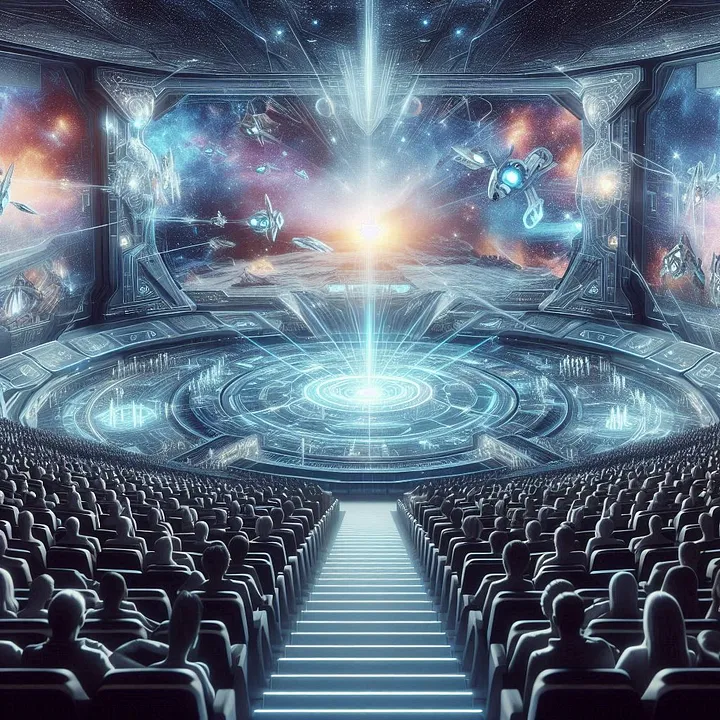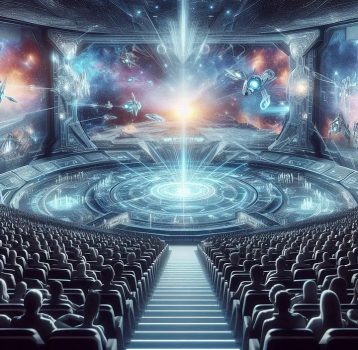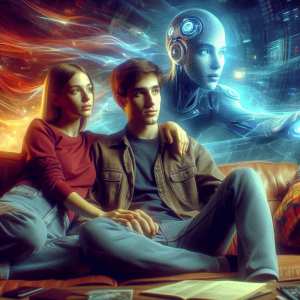
Introduction
A brief introduction to the “presentations” that will follow
(Romanian)
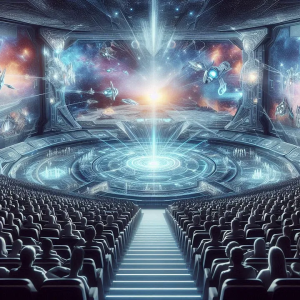
The years pass us by and, after over 56 years of “Science Fiction” and assimilated “species” (at the time of writing these lines), as a long-time reader (even a writer, including involvement in the world of video games, maintaining on his website several “sections” of reviews, “chronological” developments in various “fields of activity” for almost 25 years, etc.), as a long-time reader, cinephile and “dedicated” gamer, I can share with you my experience in “identifying” the best “Science Fiction” novels (and assimilated subgenres), films, series, animations, “genre” video games…
“Experiences” that will include “chronology”, small descriptions, findings of influence, and much, much more (you will be able to read about all of this)…
To cover this area, this effort’s “quality” arguments will be grouped into “opinions,” which can be “synthesized” according to their form of manifestation: novels, films, television series, animations, video games, etc.
For example, regarding the film, the arguments would be:
“Against”
Essentially, it wouldn’t be hard to access existing sources on the internet, such as:
- IMDb (Internet Movie Database) (one of the largest online databases of movies, TV series, actors, and directors, providing detailed information about movies, including cast, reviews, ratings, and release dates, and, I admit, my favorite “search” platform, used since “time immemorial”),
- Rotten Tomatoes (a site that aggregates reviews from critics and audiences to provide an overall score of a film, useful for finding diverse opinions and getting a balanced perspective),
- Metacritic (similar to Rotten Tomatoes, compiling reviews from critics, converting them into a numerical score, and also providing details about the cast and production team),
and there would also be Letterbox (a social platform for moviegoers), AllMovie (an extensive database that provides information about movies, actors, directors, and genres), The Movie Database (TMDb) (similar to IMDb, providing details about film, including cast, synopses, and ratings) and, why not, CineMagia (a Romanian platform that provides information about movies, actors, and series, useful for finding out details about local productions).
All these platforms have their own “ranking” (based on various criteria, such as “ratings” given by users, “box office” and “values”, including financial gains, etc.) and offer the information seeker evaluation “solutions” tested by time and by readers.
Similar “forms” of “evaluation” and information can also be identified in the world of “Science Fiction” novels and assimilated subgenres (I specify, strictly novels or other “smaller”/”shorter” works but which, through serialization, can be considered novels), as well as in the world of video games (see below).
„Pro”
Do you think that by going through the aforementioned sources, we are discussing the real value of a film, genre, etc.?
Aren’t these “details” related to each of us individually?
So, I will proceed with my evaluation (where my family environment, friends, people “with relatively longer experience”, various opinions, traveled” throughout life, etc., involuntarily participate), and I hope that I will provide you with clear “track record” data that will be useful to you.
All of these will strictly “express” the “science fiction” genre and “assimilated species” and I will take care to group them, more “difficult” at first, but time will bring about the optimal “adaptation” of my presentations (without forgetting that this form of online presentation can be updated at any time, improved with each “accumulation” that I will identify).
And the same perception will be the case with the other categories or forms of manifestation of “Science Fiction”…
For example, in the world of “Science Fiction” books, you can call ISFDB, the list of Locus, Nebula, and Hugo awards, the resources of the “Big 4” publishers (Macmillan, Hachette Livre, HarperCollins, and Penguin Random House), etc… For the world of video games, you can call IGDb (the counterpart in the world of movies), UVL, RAWG, or others…
Each with their sources of “search inspiration”, their way of interpreting “Science Fiction” and the associated subgenres, etc. (without forgetting the actual manifestation of what would be “penetrability” or “visibility” in the public, paid or not, marketed or perceived).
However, the purpose and structure of this series, under the name “The Evolution of Science Fiction,” is an effort to explore in detail the evolution of the Science Fiction genre, analyzing all its forms of manifestation—from literature and cinema to TV series and video games.
Rather than just being a review of popular titles, this series will highlight the impact of each medium on the development of the genre, cultural and technological influences, and how Science Fiction shaped and was shaped by its era.
The series will follow a chronological approach, exploring each year through the lens of its significant contributions to Science Fiction (only the first few episodes will address slightly larger “periods” of time), grouped as follows:
- Novels and Award-Winning Literature – We will analyze the works that have won prestigious awards such as the Hugo, Nebula, and other relevant distinctions, highlighting literary trends and their impact on the genre.
- Science Fiction Films – We will explore the cinematic productions that influenced audiences and defined the future directions of the genre.
- TV Series and Sci-Fi Animations – We will analyze series that have stood out, either through popularity or through thematic and narrative innovations.
- Sci-Fi-themed video games – We will discuss landmark titles that brought innovative sci-fi concepts, either from a narrative or technological point of view, etc.
This approach will not only provide an overview of the evolution of Science Fiction but will also highlight the connections between the different media of expression of the genre, showing how literature, films, series, and video games have influenced each other over time.
Throughout each episode, I will also bring personal opinions, detailed analysis, and critical observations on how Science Fiction has evolved and left its mark on modern culture.
Opinions that will be “associated” with details regarding the “identified” novels, films, and video games and summarized with the idea of also offering suggestions on the topics “discussed” in the respective “works”, constituting a kind of study about what to write or what to develop in the future “science fiction work” that a future author will create.
To all the “sources” presented previously are added numerous “critical” or informative approaches, such as:
- Various “specialty” sites, such as ISFDB, Locus, Nebula, Hugo,
- The various sites of “presence” engaged in truly titanic efforts, such as Fear Planet, Fantasy Review, Andrew Gibson’s „Sci-Fi Classics from the 1950s and Beyond”, even Wikipedia (which includes many “sections” or “approaches”, such as Timeline),
- “Video” approaches such as “Science Fiction Theatre” (a television series with 78 episodes of 25 minutes each, which “ran” between 1955 and 1957), “Masters of Science Fiction” (a television series of 6 episodes of 42 minutes each that ran in 2007), “Prophets of Science Fiction” (a television series of 8 episodes of 45 minutes each, which ran between 2011 and 2012) or “James Cameron’s Story of Science Fiction” (a series of 6 one-hour episodes that ran in 2018).
And, time will decide whether I am right or not…

Let’s start, however, with the introduction!
Some structuring is needed, “based” on the “species” of literature, “compatible” with “Science Fiction” (and associated subgenres)…
A structuring that will be based on a kind of “evolutionary middle line” that can be identified in the triad of palpable, existing manifestations: “novels – films – video games”, where the films represent a kind of starting point that approaches the whole.
And this, without “emphasizing” some “Top” type “classification”, would be represented by:
- Space Opera (films, series, animations, video games that depict a story that takes place in outer space and involves epic adventures, interstellar conflicts and charismatic characters, a “typical” example being the “series” “Star Wars“, “Guardians of the Galaxy“, “Startrek“, etc.),
- Dystopia/Post-apocalyptic (“presents” that depict bleak futures, corrupt societies, or worlds devastated by wars or disasters, such as “The Matrix“, “Mad Max“, “Blade Runner“, etc.),
- Cyberpunk (a subgenre that explores the relationship between technology, society, and humanity, these “achievements” having a futuristic aspect, with dark metropolises, artificial intelligence, and hackers such as “The Matrix“, “Ghost in the Shell“, etc.),
- Time travel (“stories” about time travel, which explore temporal paradoxes and the effects of changing the past or future, such as “Back to the Future“, “Looper“, etc.),
- Extraterrestrials (“achievements” that focus on encounters with extraterrestrial beings and the exploration of outer space, such as “E.T. the Extra-Terrestrial“, “Close Encounters of the Third Kind“, etc.),
- Hard Science Fiction (subgenre that is based on realistic scientific and technological concepts, addressing themes such as quantum physics, biotechnology, or space exploration, such as “Interstellar“, “2001: A Space Odyssey“, etc.),
- Alternative histories, alternative universes (films, works that explore worlds in which historical events unfolded differently, that offer “evolutionary” and “similar” alternatives, such as “Inglourious Basterds“, “Watchmen“),
- Robots/Androids (… about robots and androids, examining the relationship between humans and intelligent machines, AIs, such as “Blade Runner”, “Ex Machina”, etc.),
- Biopunk (subgenre focusing on genetic modification and biotechnology and “similars” such as “Gattaca“, “Splice“, etc.),
- Nanopunk (“achievements” that explore the use of nanotechnology and materials at the atomic scale, such as “Transcendence“, “Nanobots“, etc.).
And, for an introduction, I think ten “categories” would be enough (and that seems like too many, and anyway, I’ll give details at the “opportune moment”)… Especially since many “works” can hardly be “classified” into a specific “species”, most achievements “touch” multiple genres.
So, let’s get started. Without forgetting to mention that, you will have to deal not only with all kinds of “technical identifications” but also with small summaries of the “essential” works, which can constitute an invaluable source of selective inspiration for those who write future masterpieces of “science fiction”…
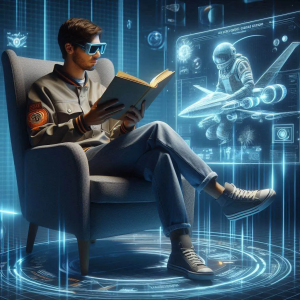
I will do all this without implying the slightest promotional effort (from my point of view, not to interpret “promotional effort” in terms of documentary-type links, but, if you force it, hmmm), describing the great achievements, often “masterpieces”, made “in the last 50 years of consciousness, possibly my memories”, which will offer “my opinion” about all this, in an attempt to constitute an indication towards the meaningful “investment” of your time, towards your pleasures (if these “fit” into “Science Fiction” and the assimilated “species”).
Being an effort based mainly on my perceptions and memories, it may seem to be a “disorderly” effort, based on the idea of creating informative materials that, quantitatively, will “contain” at least 1,000 words per episode, grouped into “evolutionary chapters”, then subchapters (which will be carefully numbered, without “delimiting” themselves to be a kind of “order” of importance but only a consequence of a chronology that is as real as possible, as documented as possible).
But, the “centralization” that will appear over time (will be “noticed” with the advance of the publication and the centralization in the “Content“) will be the “cream” (and, I suppose, the value) of this effort offered by me to you…
Centralization, I will create “dedicatedly” for a kind of Science Fiction Literature Circle “Around the Worlds” (publishing on a kind of social platform “for writers” being initiated on Medium), both in Romanian and in English.
Yes, one more clarification (even though it seems like I’m repeating myself)…
I will seek to provide as many links to the mentioned materials as possible, thus providing a kind of “officialization” of my statements.
Thank you for the over 50 years of “Science Fiction” we’ve lived together!
Thank you to everyone who will read my work, even partially!
Merticaru Dorin Nicolae
